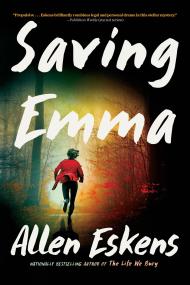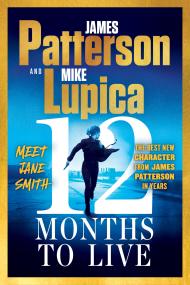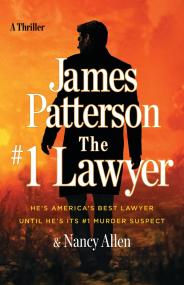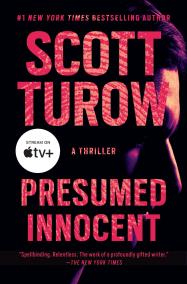Hard to Kill
Meet James Patterson’s Greatest Character Yet
Contributors
By Mike Lupica
Read by Eva Kaminsky
Formats and Prices
Price
$24.99Format
Format:
- Audiobook Download (Unabridged) $24.99
- ebook $14.99 $19.99 CAD
- Hardcover $30.00 $39.00 CAD
- Trade Paperback $19.99 $25.99 CAD
- Trade Paperback (Large Print) $34.00 $44.00 CAD
Also available from:
Instant New York Times Bestseller!
“With Jane Smith, Alex Cross has reason to be jealous” (Good Morning America). Hard to Kill features James Patterson’s greatest character yet–a tough-as-nails attorney up against a relentless killer.
Attorney Jane Smith is mounting an impossible criminal defense.
Her client, Rob Jacobson, is the unluckiest of the unlucky. No sooner is he accused of killing a family of three in the Hamptons than a second family is gunned down.
It’s not double jeopardy. It’s not double murder. It’s double triple homicide.
Jane’s career has spanned from NYPD beat cop to Hamptons courtroom. She’s tough to beat. She’s even tougher to kill.
The defense may never rest.
Genre:
Series:
- On Sale
- Jul 29, 2024
- Publisher
- Hachette Audio
- ISBN-13
- 9781668638996
Meet the Authors
What's Inside
ONE
JIMMY CUNNIFF CALLS TO tell me to get dressed, we’re taking a ride.
“Am I allowed to ask where we’re going?”
“To check in on an old friend.”
“Am I allowed to ask which one?”
He tells me. And I tell him I’ll be ready when he gets to my house.
Now we’re standing at the top of steps leading up and into a courthouse, a new one for us, the Nassau County Courthouse in Mineola.
Rob Jacobson, my former client, one I recently got acquitted of a triple homicide in Suffolk County, is about to turn himself in one county over. On another triple homicide. Like Jimmy always says: You can’t make this shit up.
“Apparently he’s gonna tour,” Jimmy says. “Like the Ice Capades.” “Ice Capades ended years ago.”
“I was making a larger point,” he says. “You often are.”
Jimmy is my investigator, wing man, best friend, former hot‑ticket NYPD detective. His divorce from the cops wasn’t pretty. But then neither were my divorces from husbands one and two.
“Here he comes,” I say.
“It’s a perp walk,” Jimmy says. “Not a red carpet.”
With plenty of time to spare, it got out, the way everything gets out in the modern world, that Jacobson and his new lawyer, Howie “the Horse” Friedlander, were going to do it this way, here at the courthouse. Jacobson’s renting a house not far from mine in Amagansett, between East Hampton and Montauk. Having him led out of a residence in handcuffs was not the optic Howie or Rob wanted, as if any good optics could come from a moment like this.
The crowd today isn’t the size that we routinely got during trial in Riverhead. A trial that ended, thanks to Jimmy and me, in Jacobson’s acquittal. But now, in what felt like a blink, he has been charged with murdering another father, wife, teenage daughter. It was the Gates family last time. This time the Carsons of Garden City.
“He says he was set up,” I tell Jimmy Cunniff.
“Set up again? For three more murders? What are the odds?”
“He’s either a psychopath or the unluckiest SOB on the face of the earth.”
“I’ll take psychopath for two hundred, Alex,” Jimmy says. “Alex Trebek is dead.”
“So are all those people.”
Howie Friedlander is walking next to Rob. Howie got his nickname because he’s about the size of a jockey. A case like this is the kind of ride lawyers like Howie and me look for their whole lives but hardly ever get.
All Howie has to do is what I did: Win.
Rob Jacobson’s trying to look as sure of himself as ever, the cameras back on him, at the center of his own three‑ring circus all over again.
“We need to get this over with,” Howie says.
I watch as the doors open and two cops who could double as bouncers step outside. One of them is carrying handcuffs, which means shit is about to get very real for Rob Jacobson.
Again.
Before they put the cuffs on him, he turns around and looks back, his eyes suddenly pleading with me. Not even trying to hide how scared he is, Jacobson puts one of his free hands — while they still are free — to his ear and mouths as if into a phone: Call me.
Then, as if he’s silently shouting at me, he mouths one last word: Please.
Then the cuffs go on him and the doors open back up and he’s gone.
Jimmy sees me staring in Jacobson’s direction. Maybe he can see in my eyes that I didn’t just tell Jacobson the whole truth. I don’t miss scenes like this, that is the truth. But I do want to be inside the courthouse, breathing that air again, instead of being out here, like I’m on the sidelines at the big game.
“Why do you look like you’ve got a hook in your mouth?” Jimmy asks.
“Probably because I do.”
•••
TWO
IT DOESN’T TAKE LONG for my friends in the media to move right in on me after Jacobson is inside the courthouse.
“Let’s get out of here,” Jimmy says as he sees them coming.
I grin at him. “And why would we want to do something like that?”
It’s worth pointing out here that for me to get more face time on cable news than during Jacobson’s first trial I’d have to be involved in a juicy sex scandal.
I wish.
From behind one of the cameras I hear, “Do you think he’s going to get away with it again, Jane?”
“Are you implying that he got away with something when I was the one representing him?”
“Just asking you what you think.”
“The jury spoke,” I say. “Almost as eloquently as I so often did during that trial.”
It gets a laugh.
I put up my hands in mock surrender now.
“Ladies and gentlemen, pay close attention, because you may never again hear these words from me, at least not consecutively: No comment.”
But it’s as if at least one of them has read my mind about being here.
“Come on. Don’t you wish it was you perp‑walking right alongside him?”
“No.”
Yes.
“Tell the truth, Jane.”
“You can’t handle the truth,” I growl.
It gets another decent laugh, if only from fans of A Few Good Men. I tell them not to forget to tip their waiters, and Jimmy and I start walking down the steps.
We’re only halfway down to the street when I see a guy in a hoodie staring up at me from the sidewalk, about fifty yards away. Giving me, in words that Jimmy taught me from his cop days, the hard eye.
Jimmy is still walking, not realizing right away that I’ve stopped, as the guy in the hoodie extends his arm, cocks his thumb and index finger of his hand, makes a shooting motion.
Then he’s around the corner and gone. Now Jimmy stops.
“You look like you saw a ghost,” he says. “I did.”
“Ghost got a name?”
“Yeah. Nick Morelli.”
A star witness in Rob Jacobson’s first trial until the Coast Guard found his fishing boat out on the water near Montauk without him in it.
“He’s dead,” Jimmy says.
I’m still staring at where he’d been on the sidewalk. “Or not.”
•••
THREE
“YOU’RE BEING WAY TOO quiet,” Jimmy says as we’re getting off the Northern State and onto the Long Island Expressway.
“I’m thinking.”
“You generally do most of your thinking out loud, you don’t mind me saying.”
“What if it was Morelli I just saw?” I ask. “And if he’s been in hiding, why did he make a point of making sure I saw him?”
Nick Morelli had once dated Laurel Gates, the teenage daughter of Mitch and Kathy Gates, all three of whom Jacobson had been charged with murdering. He’d testified about seeing Jacobson making out with Laurel Gates across the street from the Stephen Talkhouse in Amagansett the summer she died.
The day after Morelli testified, he’d disappeared. Body never found.
Jimmy says it’s still an open case with the East Hampton Police. Being Jimmy, he checks from time to time, but they keep telling him there has been no evidence — credit card or bank statements or sightings — that Morelli is still walking among us. “There was a time when we thought Jacobson might have had Morelli killed, remember?” I say to Jimmy. “Just because Morelli wasn’t going to do our guy much good alive.”
“Stop me if you’ve heard this one before,” Jimmy says. “But our guy said he didn’t do that, either.”
We drive in silence for a few miles before Jimmy suddenly bangs his hands hard on the steering wheel. Saying something I know he’s wanted to say since we left Mineola.
“You can’t really want to defend him on this Carson thing.”
I smile because I can’t keep myself from smiling. Because he’s got me and we both know he’s got me, the only thing left is to slap the cuffs on me.
“You’re right, Cunniff. I can’t tell you that.”
“Shit,” he says. “I was afraid of that.”
We make the turn at Exit 70, getting on Route 111, the connector road that will put us on 27 all the way to my house in Amagansett.
“I knew I shouldn’t have taken you there,” Jimmy says. “I should’ve known that being that close to the action would be like some kind of drug.”
“Yeah,” I say. “That’s what I need these days. More drugs.”
“Poor choice of words.”
“But I can’t lie to you, Cunniff. For a few minutes there in front of that courthouse, I actually felt like my old self again. Like I’m still the woman you refer to as Jane Effing Smith.”
I don’t tell Jimmy Cunniff the whole truth and nothing but, that there on those steps, I felt so alive I forgot I was dying.
That I didn’t have effing cancer.
•••
FOUR
DESPITE THE USUAL HAMPTONS traffic heading east, Jimmy gets me to my doctor’s appointment in Southampton with plenty of time to spare.
When we pull up to Dr. Samantha Wylie’s office, I ask if he wants to come in with me, and hear whatever I’m about to hear, so later he can’t accuse me of holding back.
“Gonna take a hard pass on that.”
I’d asked knowing the answer. The only people in the world who scare Jimmy, truly, are doctors. He’d rather have somebody pull a gun on him. The only doctor he tolerates is my boyfriend, Dr. Ben Kalinsky.
And Ben’s a veterinarian.
Sam Wylie isn’t my oncologist. Just my internist. But so much more than that. She’s been my friend since junior high school. I sit down across from her desk, where she’s been reviewing my latest test results.
I have stage 4 cancer. Neck and head. Mostly neck. You know how people talk about the Big C? Trust me when I tell you something:
There’s no Little C.
When I visit Sam’s office, I sometimes imagine her as a professor about to tell me I’m flunking my major, and the final is just around the corner.
I’ve just gone through my second round of chemo. Against all odds, I’ve still got my hair. And don’t plan to give it up without a fight.
I’m not giving up without a fight, period. “Good news first, or bad?” Sam says. “Surprise me.”
“The good news is that your numbers haven’t gotten any worse.”
I go blood test to blood test. All cancer patients know the drill, labeled day‑to‑day like some injured athlete. It doesn’t feel like living.
“Wait for it,” I say.
“The bad news, unfortunately, is that they haven’t improved to the extent that I’d hoped they would after two rounds of chemo. Or might.”
Sometimes I feel as if the last really good news I received is when the jury foreman in Rob Jacobson’s trial said, “Not guilty.”
“So what do we do?”
“We keep doing what we’re doing,” she says. “At least we’ve slowed its progress, which ain’t nothing, pal.”
“You’ve talked about this with Dr. Gellis.” Who is my oncologist.
“I have started to feel, since the patient is my friend Jane Smith, that I talk to Mike Gellis more than I talk to my husband these days.”
She then patiently explains to me, not for the first time, the confidence she has in Gellis. She hasn’t changed very much since we went to school together and she was the smartest girl in our class. Even smarter than me. Not that I was going to admit that to her, then or now or ever.
“We both know what great physical condition you were in before this,” she says, “when you were still training for those no‑snow biathlons. And you’re still young.”
“Define young.”
I thought that might get a smile out of her. It doesn’t.
Tough room.
“I’m not even classifying today’s numbers as a setback,” she says. “Just part of the process.”
I smile at her now.
“You’re one of the best friends I’ve ever had,” I say. “So please don’t bullshit me. Remember, we’ve got a deal about you not bullshitting me. So promise me again that you won’t.”
Her voice is suddenly small enough to fit in the palm of my hand.
“I promise,” she says.
Then, just like that, she starts to cry.
Really cry. Chest heaving. Sobbing‑type crying. Trying to get air into her and failing. Losing it.
Maybe I’m too stubborn, even now, to break down in front of her. There have been times, plenty of times, when I’ve lost it in the privacy of my own home. Or with Dr. Ben. Or on a beach walk with my dog, Rip.
Just never in front of her.
Before I know it, she’s come around the desk and the two of us are standing in the middle of her office, arms around each other, her tears finally beginning to subside. She’s the doctor. She’s the one giving me what passes for good news these days. Only now I feel like I’m the one consoling her.
When we both step back and out of the hug, Sam Wylie’s face is a mess for what I think is the first time in all of recorded his‑ tory. She does manage to smile now, embarrassed.
“Sorry about that.”
“Don’t take this as a criticism,” I tell her. “But you may think about doing some work on your bedside manner.”
I get to the door, but then turn around.
“I don’t want you to die,” Dr. Sam Wylie says. “Imagine how I feel.”
•••
FIVE
Jimmy
JIMMY IS SURPRISED WHEN he looks up to see Jane walking toward his car so soon. But it doesn’t matter.
He knows that even if she’s inside with Sam Wylie until tomor row morning, he’ll still be out here waiting for her. Jimmy has promised her he won’t let her go through this alone. He keeps his promises.
Especially to her.
“So how did it go?”
“Great,” she says.
“You don’t look great.”
“Thanks for sharing.”
“You know,” Jimmy says, “people say that sarcasm is the weapon of the weak.”
“I am weak,” she says in a quiet voice.
“No,” he says, “you’re not. You’re tougher than me, and nobody is tougher than me.”
“Does that even make sense?”
“To me it does.”
They’re stopped at the light where Main Street merges into 27. He feels her eyes on him, turns so he can see her.
“What?”
“I love you,” she says.
Then his girl smiles at him and it’s as if all the seriously bad shit she’s got going in her life suddenly washes away.
Jimmy actually feels a catch in his throat as he remembers, all over again, how much he loves her right back.
Not that way, of course.
It was never that way for either one of them, even when they first started working together and he was coming off a divorce and Jane was coming off her second. He loves her like a sister. Or the best friend that she is.
Both, probably.
He’d always known he’d take a bullet for her if he had to, something that finally happened, twice, while he was working the Carson case. Knows in his heart that he’d take cancer of the neck and head for her if he could, without hesitation.
“How did it go for real?” he says when the car is in motion and going through Water Mill.
“Basically, no change, according to the good doctor.”
“So, for today it’s a push,” Jimmy says. “A push isn’t a loss, right?” “Sure,” Jane says, without much enthusiasm.
Then she tells him to take the back roads, she likes the back roads better.
By the time they get to Scuttle Hole Road, Southampton becoming Bridgehampton, she’s asleep. Jimmy punches the button for the Miles Davis channel on satellite radio. He really only bought satellite radio because it makes it easier, this far from the city, for him to actually hear Yankee games in the summer.
Miles is playing “So What.”
In a soft voice, covered by Miles’s horn, Jimmy says, “You either beat this or else.”
From the seat next to him he hears, “Or else what?”
He grins. “I’ve never been entirely sure. But it always sounds good.”
In that moment he hears the little ping that means a text message. It’s Jane’s phone, not his.
She reaches into the pocket of her jeans and comes out with it.
“What the hell?” she says. “What?”
“Text. Unknown number.” Then she reads it to him:
Wouldn’t you just rather die in peace?
Jimmy turns down the radio, so it’s quiet then in the front seat of his car.
Jane is still staring at her phone. “Is that all of it?” Jimmy says. “It’s signed.”
“By who?” “Joe Champi.” “Excuse me?”
“You heard me. It’s signed “Joe Champi.”
“Morelli is only presumed dead,” Jimmy says. “Champi really is.”
“I know,” Jane says. “I killed him, remember?”
•••
SIX
JIMMY TAKES THE THREAT seriously, even if it came from a dead guy.
Joe Champi: former NYPD the way Jimmy is, the guy Rob Jacobson called Uncle Joe. The guy who’d been a fixer for Jacob‑ son from the time he was first cop on the scene when Jacobson’s father killed a teenage mistress named Carey Watson and then himself.
Jimmy is convinced that it was Champi who made Nick Morelli’s boat come back without him that day. And who made Gregg McCall, the Nassau County DA, disappear after McCall hired Jimmy and me to look into the murder of the Carson family.
Jimmy is also convinced that it was Champi who ambushed and murdered Jimmy’s old police partner, Mickey Dunne, after Mickey started looking too hard into Rob Jacobson’s past. Fix‑ ing for Jacobson until the end.
Jimmy makes calls to his former NYPD contacts now, keeps making them after we arrive at my house. And keeps getting the same answer, that unless whoever sent the message is an idiot, it came from a burner phone.
“So absolutely no way to trace where the text came from?” “Sure,” Jimmy says. “Right after we put a trace on where the wind comes from.”
Rip the dog goes crazy when we arrive. Being a trained investigator myself, I have come to suspect that Rip likes Jimmy better than he likes me.
But then most people do.
We’re sitting on my back porch. Jimmy is throwing a tennis ball. Rip brings it back, every single time, as if he’s willing to do this until the endof time. He doesn’t bring it back quickly. The old boy has lost a step. Or two. But ask yourself: who hasn’t?
“He doesn’t do that for me,” I say. “Must be a guy thing.”
Jimmy throws the ball as far as he can. Off goes Rip.
“I don’t get a lot of text messages from dead guys,” I mention to Jimmy.
“Especially not ones that you madedead.”
Jimmy is heading over to his bar from here. Dr. Ben Kalinsky is coming over in an hour to cook dinner for the two of us. Ben’s not a better cook than I am. He’s nicer.
“Okay, Jimmy. Who sends me a text like that?” “Jacobson?”
“Why? We both know he wants me to defend him again, even if he hasn’t asked yet.”
“It is still my opinion that he’s batshit crazy.”
“He’s locked up now until his bail hearing. You can get a burner into jail?”
“Are you joking?” Jimmy says. “I’m surprised guys aren’t starting their own YouTube channels from jail.”
I check my watch.
“I’m sorry,” Jimmy says. “Am I boring you?”
“Got a hot date. Need to take a shower, do my makeup. Then do hair, while I still have my hair.”
Jimmy has his beer in his left hand. Keeps throwing the ball with his right. Rip keeps fetching it. Rip is supposed to be way past his sell‑by date. But the old boy really is hanging in there.
Like he’s beating the odds. My hero.
“Whoever is messing with you,” Jimmy says, “which means messing with us, knows who Champi is. Or at least knows about him. Could whoever it is know what Champi knew?”
I laugh now. “Are you shitting me? We don’t even know what Champi knew.”
I take the ball from Jimmy and show off my arm. Nobody ever accused this particular girl of throwing like a girl. Rip chases it down to the end of the yard. Then he turns around, gives me a look.
And drops it in front of Jimmy.
Screw him. Game over. I put the ball on the table and leave it there. That’ll show him.
Jimmy finishes his beer, then asks me one more time if I’m sure I saw who I thought I did in Mineola.
I didn’t get that good a look at the guy, I tell him, but it sure looked like Nick Morelli to me.
“Who knows, maybe it is a day for the walking dead,” Jimmy says.
“Gee, there’s a lovely thought on which to build a night of romance.”
“Too much information,” Jimmy says, and leaves.
I’m on my way up the stairs to start getting ready for my date when there’s a knock on the door.
When I open it, Jimmy’s standing there. “You forget something?”
He wordlessly hands me his phone, so I can see the text on the screen.
I still owe you 2 one. Uncle Joe
I hand Jimmy back his phone, asking, “Who knew you could get cell service like this in hell?”






